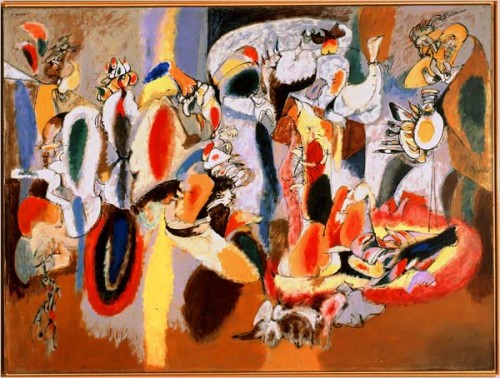And Then We Came to the End

Today, I went to the Philadelphia Museum of Art (which, it must be said, is quite expensive and staffed by some insanely rude and surly individuals). I walked briskly up the Rocky Stairs. I also saw interesting and confusing and awesome art objects but the best exhibit was a retrospective of the work of Arshile Gorky. Toward the end of the exhibit was a placard discussing the end of Gorky’s life which, as is the case for most artists, ended tragically. In one of this final interviews, Gorky stated, “”I don’t like that word finish. When something is finished, that means it’s dead, doesn’t it? I believe in everlastingness. I never finish a painting–I just stop working on it for a while.”
Gorky’s comment has had me thinking all afternoon about when a story or a poem or other creative work ends or is finished. How do you know? Do you, as Gorky does, believe in everlastingness and that to finish something is to kill it?
The Religion Thing
Last week while I was visiting family in Mississippi, I spent more time in church than I have in the past two years. This reminded me that from the age of 4 and 14, I spent roughly 490 Sundays in church excluding occasional sick days. That’s 1,225 hours when you include Sunday school and “fellowship” time. In addition to regular Sundays there were Wednesday night dinners, youth group meetings, confirmation classes, summer Bible school, youth choir practice, choir tours and weekend retreats. I’m estimating that about 3,500-4,000 hours. Yikes!
But what effect does all this Jesus have on one’s writing? I can’t speak for everyone who has had this kind of upbringing, but for me, church-going led me directly into writing. Prayer led to journaling; journaling led to disgraceful poetry; disgraceful poetry led to disgraceful fiction, then to essays and memoir and more fiction. But church also instilled a reverence for narrative and the inclination to analyze and obsess over stories and books (first books in the bible, of course, but then others.)
Just in time for Christmas, N+1 posted this video of their panel discussion titled Evangelicalism and the Contemporary Intellectual and it’s pretty interesting, though the title is slightly misleading. (It’s not just about Evangelicalism, which is a very particular corner of Protestantism, but about growing up in the church in general.) READ MORE >
Thoughts on Submission (SFW)

These are some thoughts in response to Sean Lovelace’s post the other day, which asked “You do send your Very Best work Every time when submitting to a literary magazine, right?”It started out in the comment thread, but then I decided that his question deserved more of a commitment than that. Here goes.
I think this idea of “best” vs “not-best” is based on a fundamental, and mistaken notion that *every*thing one writes ought to be published. One-offs, exercises, middling poems and pieces of “flash”–well I already wrote it, the logic goes, so why not place it *some*where?
Q & A #2

If you have questions about writing or publishing or whatever, leave them in the comments or e-mail them to roxane at roxanegay dot com and we will find you some answers.
Q1: What are some good ways for a writer to self-promote? bad ways? are there unwritten, unspoken rules? rules of engagement?
Ken
Share: tell those you respect they can read something that you’ve written. Tell them twice. Move.
Amy
The same advice you’d give to a girl who can’t get a date would apply here too: Be confident! Don’t insult your own work. People will start to believe you if you keep saying your story is shit. At a reading, don’t count down to the end of your reading (just 4 more poems, just 3 more poems). Assume that if people came to hear you read, they want to hear you read.
Karma works too. Help promote your friends and people whose work you admire, and they will help promote you.
Dee Dee Ramone on Writing
Dee Dee Ramone was the first man with a woman’s name to be like, “Fuck your necktie and your mom’s gurney.” Dee Dee Ramone had the impact of keeping hand grenades in your car’s cup holders. The man was a retaining wall and a fuck-load cooler than we. He was so beautiful he had to kill that beauty, as we know the world must work. Or not work.
“I have no doubts in my mind where my loyalties are. They’re with myself. I’m all I’ve got.”
“I like dragons so much that I tried to look for one outside the window of the plane that I’m in now.”
“My only degree is in streetology.”
“Today I was wondering what God was going to do with me now.”
“I’m not a punk, skin, Nazi, or snob. I’m defiant. I’m angry. You made me that way. So fuck you all.”
“Dragons…Imagine one flying over one of the meadows, high above New York City’s Central Park, one crowded Sunday afternoon.”
“We all paid a price for it. It was a lot.”
“I can’t rap too well.”
“I would like to thank myself, and congratulate myself, and if I could, I would pat myself on the back.”
“I spotted a dragon immediately.”
How It’s Made: Chains
This thing on chains is my favorite How It’s Made segment.
HOW TO DO THINGS WITH WORDS, LECTURE 1
This is the first post concerning the book HOW TO DO THINGS WITH WORDS. The book contains twelve lectures, delivered at Harvard University by JL Austin on the nature of language. The importance of these lectures is, to me, the uncovering of language as a particular kind of instrument between people, and how literal meaning is not the only use of language.
Some Notes on Affect
 A lot that’s happening on this site right now, in posts and in comments, has somehow coalesced around a few themes and texts that I first explored seriously in a college course I took, called Excess, that focused on, well, the literature of excess, or transgression: Sade, Bataille, Sacher-Masoch, and films like Irreversible. It was taught by Paul Mann, poet and author of Masocriticism, which, as its title suggests, radically exposes the viscera gaping from the act of reading and interpreting texts. He writes,
A lot that’s happening on this site right now, in posts and in comments, has somehow coalesced around a few themes and texts that I first explored seriously in a college course I took, called Excess, that focused on, well, the literature of excess, or transgression: Sade, Bataille, Sacher-Masoch, and films like Irreversible. It was taught by Paul Mann, poet and author of Masocriticism, which, as its title suggests, radically exposes the viscera gaping from the act of reading and interpreting texts. He writes,
The text never recognizes us. It neither assents to nor dissents from our reading, our desire. Whatever validations we establish, it remains silent throughout our reading.
At the end of each reading, it returns as a Greek.
At the end of each masocritical scene, one is abandoned to the absolutely otherness of the other. One suffers an utter loss of agency, out of and against which a new scene or new reading must be projected.
This formulation of the text recalls Bataille’s vision of the sun burning itself up with no consideration for the life that its combustion nurtures, a concept that is central to much of Bataille’s work (including the essay whose title I stole for the reading series I run w/ Blake and Jamie Iredell in Atlanta, Solar Anus). The way Mann equates the sun with the text deepens this idea of reading as hyper-sensory experience. READ MORE >
Craft Fitness: On Writing Exercises

The first writing exercise I assign in any class is to have students write a brief (500 words) essay, reflection or story (depending on the course) in response to a specific prompt using only one syllable words. As I relay the assignment, students express a charming range of reactions from “this bitch is crazy” to “this is impossible and this bitch is crazy,” but off they go to their dorm rooms and apartments and two days later, they return to class having written something within the assignment’s constraints and having learned about the value of a thesaurus.



 I tried to write a couple of jokes for a friend of mine who is a stand-up. Here’s one: You know, with all the sneaking around in the dark, the shouting, and the forcible sodomy, a home invasion robbery is pretty much exactly like a surprise birthday party. Except without cake.
I tried to write a couple of jokes for a friend of mine who is a stand-up. Here’s one: You know, with all the sneaking around in the dark, the shouting, and the forcible sodomy, a home invasion robbery is pretty much exactly like a surprise birthday party. Except without cake.